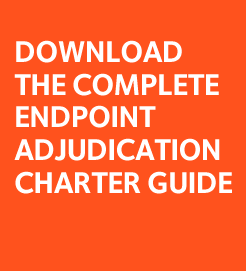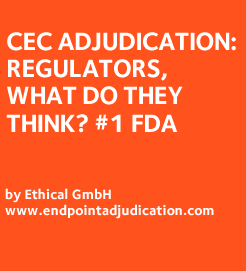Endpoint Adjudication
The procedure by which clinical events identified as potential endpoints are submitted to a panel of independent experts to be assessed in a blinded way. Adjudication is used in clinical trials to manage subjective evaluations like imaging and adaptive design.
Adjudication Assessment
The core operation of an Adjudication procedure. It is usually obtained by combining the judgments of several (3 or more) Reviewers. The Assessment is collected through the adjudication forms (paper or electronic).
Adjudication Charter
The Adjudication Charter is the fundamental document describing the Adjudication Standard Operating Procedures applicable to a specific Clinical Trial.
The Adjudication Charter typically includes the following sections:
- Study abstract/ adjudication rationale
- Adjudication roles
- Endpoints definitions and identification criteria
- Potential endpoints events sources
- Event Package composition (documents, images, key data)
- Event submission procedures
- Assessment workflow and timelines
- Assessment Forms structure and constraints
- The procedure to request and handle "more data" for incomplete or unsatisfactory event information
- The procedures to handle disagreements in Central Adjudication Committee (CEC) members assessments
- The procedures to establish and run Consensus Meetings
- The procedures to handle changes in the event information delivered after event's submission to the CEC members
- The procedures and trigger for Communication among Coordinator, Staff and CEC Members
- Adjudication deliverables and data structures
- The procedures to conduct Quality Control
For further Information you can
DOWNLOAD A COPY OF THE ENDPOINT ADJUDICATION CHARTER GUIDE (13 pages)
Adjudication Chairperson - Chairman
The person who presides the Central Adjudication Committee and ensures the respect of procedures. The Adjudication Chairperson is often requested to resolve disagreement situations
Adjudication Coordinator(s)
The staff person(s) coordinating all the Adjudication operations and procedures. Usually in charge of event submission to the CEC Reviewers.
Adjudication Committee (see also CEC)
The group of persons in charge of assessment of clinical trial subjective endpoints. The Adjudication Committee is usually composed of independent expert clinicians that operate independently and are blinded to the clinical trial operations.
Adjudication Form(s)
The form(s) used by the Adjudication Committee members to perform and record their assessment. The forms can be processed as paper or, as online fillable forms using Electronic Data Capture (EDC) provided by an eAdjudication software.
Adjudication Form(s) Edit Checks
The tools and criteria by which the inputs of Reviewers into the eAdjudication form are checked for missing, inconsistent or wrong values and other fill-in mistakes.
Adjudication Reviewer(s)
The independent experts in charge of endpoint assessment. Collectively referred to as the Adjudication Committee or CEC.
Adjudication Roles
The most frequently used roles are the following:
- CEC Chairperson
- CEC Coordinators
- CEC Staff - Endpoint Office (EPO)
- CEC Reviewers
- CEC Data Manager
- CEC Quality Control
Adjudication Workflow
The procedure, as described in the Adjudication Charter, by which the Adjudication assessment is made. It's usually defined by stating:
- How many coincident judgments are needed for a valid assessment
- How CEC members judgments are composed in the final assessment
- What happens in case of disagreements
- What happens in case of re-submission following changes in the event information
Clinical Endpoint(s)
In a clinical research trial, a clinical endpoint generally refers to the occurrence of a disease, symptom, sign or laboratory abnormality that constitutes one of the target outcomes of the trial, but may also refer to any such disease or sign that strongly motivates the withdrawal of that individual or entity from the trial, then often termed humane (clinical) endpoint.
A clinical trial will usually define a primary endpoint as a measure that will be considered the success of the therapy being tested (e.g. in justifying a marketing authorization approval). The primary endpoint might be a statistically significant improvement in overall survival (OS). A trial might also define one or more secondary endpoints such as progression-free survival (PFS) that will be measured and are expected to be met. Finally, a trial might also define exploratory endpoints that are less likely to be met.
CEC Adjudication (see also Adjudication Committee)
Central Event Committee also called Clinical Event Committee.
Same as Clinical Endpoint Adjudication.
Clinical Severity
The term 'clinical' severity' is now often used for studies regarding COVID-19. Studies of clinical severity are influenced by factors such as how cases are defined, how the denominator is determined, the setting and demographics of the study populations, the availability and quality of health care, and the duration of follow-up.
To know more about a Covid19 vaccine adjudication, please read
this blogpost.
Consensus Meeting
A meeting, usually face to face, between (selected) Adjudication Committee members, to resolve the events with conflicting CEC Members' judgments following initial assessment.
EAC: Endpoints Adjudication Committee
Same as Adjudication Committee.
eAdjudication®
An online software system designed to support the Endpoint Adjudication process.
See also
eAdjudication Software Features and Benefits
eAdjudication® Legacy Integration(s)
The procedures and software systems that allow for a direct communication of the eAdjudication environment with other external and pre-existing software systems (e.g. Medidata EDC, CTMS, Oracle Argus). Integration of software is usually implemented for selection/collection of potential endpoint event information (source medical records).
Endpoint Office
The central Staff that manages and oversights the Adjudication process operations.
In charge of Source Medical Records collection, translation, redaction, submission to the reviewers, as well as issuing queries to Sites for unreadable or missing documents.
Event Adjudication
Same as Endpoint Adjudication.
Event's Changed Data
The situation of an event for which the related information has substantially changed. Usually, these changes lead to re-submission.
Event Dossier / Package / Info
The complete set of information that is delivered to the CEC Members to support their decision about Study Endpoints. It is usually composed of documents (medical records, laboratory reports, case histories, images, key variable values).
Adjudication Dossier / Package Assembling
The procedures to make the Event Dossier ready for the submission to the Adjudication Committee. It usually includes the collection of Medical Records from the Site / Source Systems and their translation, de-identification / anonymization, revision for completeness.
Event Pending Adjudication
A potential endpoint event that is waiting for the CEC Committee assessment decision.
Event Re-submission
The process by which the Adjudication Coordinator is submitting a potential endpoint that's has been already assessed by the Committee, for a new assessment by the Committee due to a relevant change or update in the Patient's Medical records.
Event Sources: for Medical Records
The information systems, legacy software, documents or clinical procedures from which the potential endpoint event information originates
Event Information Redaction
The process by which all the personal or site information are removed from the Event's Medical records before assembling the Event's Dossier and submitting it to the Adjudication Committee.
This is a typical operation performed by the Adjudication Central Staff to ensure the blinding of the Reviewers.
Event Status
The current status of potential endpoint events during the Adjudication workflow. Most common statuses are: to be submitted, pending decision, to be discussed, resubmitted, changed data, closed, etc.
Event Submission
The process by which the Adjudication Coordinator presents a potential endpoint, together with its information package, to the Reviewers for the assessment.
SAE Reconciliation - Safety Data Reconciliation - Serious Adverse Events Reconciliation
The process by which
Serious Adverse Events (SAEs) information is reviewed and compared across Clinical Data Management (EDC) and Pharmacovigilance Databases to ensure data consistency.
eReconciliation®
The Ethical's cloud software designed to improve efficiency and quality during the Serious Adverse Events (SAEs) Reconciliation process.
See also
eReconciliation Software Features and Benefit.
Major Disagreement
The outcome of conflicting judgments made by the Committee Members about the same event. It is usually handled by delivering the event to the Consensus face to face Meeting for ultimate assessment.
Minor Disagreement
A Disagreement in the Committee Members' that relates to a lesser aspect of their assessments. Usually managed and resolved with a simple procedure to minimize impact on the study management. (e.g. the Chairman can solve the disagreement without a Consensus Meeting).
Additional Data Request
The procedure by which a Reviewer ask for more information about an event that he's currently not able to assess due to inadequate or incomplete information. Usually, the staff manages the requests by issuing a query to investigators/sites handling the related patient.
Event Query
Question sent to Sites' Investigator by Adjudication Satff or Reviewers to clarify Event's Dossier information or to request a missing document.
Potential Endpoint(s)
A Clinical Event that has the potential to constitute a Study Endpoint. Attributes that identify such a potential endpoint and the criteria that allow its detection are usually defined in the Adjudication Charter. The potential endpoints qualification as “real” Study Endpoints is made by the Committee Members and constitutes the core of the Clinical Adjudication process.
Reviewers Qualification
The procedures ensuring that every Reviewer included in the Adjudication Committee, is well qualified (with appropriate training) for the Clinical Assessments requested by the Adjudication Charter. Qualification is usually performed by submitting to the Reviewers some events with a well-known interpretation and comparing their judgements with the standard interpretation.
Reviewers Re-qualification
Same as Reviewers Qualification but applied in a later time, during the Adjudication study duration, to ensure that the Reviewer is still qualified. Failure to pass this step must lead to the Reviewer's re-training or exclusion from the Committee.
Reviewer Intra-variability
A quality control metric of the Endpoint Adjudication procedure aimed at detecting and measuring the grade of consistency of a Reviewer's assessments over time. It is usually calculated by re-submitting in different times the same event to a Reviewer and comparing the results to detect any discordance in their judgements.
Reviewer Inter-variability
A quality control metric of the Endpoint Adjudication procedure aimed at detecting and measuring the level of disagreement among the Reviewers. It is usually defined as a percentage of events that lead to a disagreement among the Committee Members.
Adjudication Quality Control
A set of procedures, measurements and metrics used to control and maintain the quality of the Endpoint Adjudication. It is usually performed by collecting and evaluating some specific and pre-defined metrics (Intra-Variability, Inter Variability, etc) throughout the study.
Related Events
A set of events or potential endpoints, related to the same patient, that need to be considered by the Reviewers as a single sequence of connected events even if happened in a different time.
Adjudication Validation Package
The set of documents used to attest that the procedures and software systems used during the Endpoint Adjudication operation are compliant with regulations (GxP, GAMP 5, US 21 CFR Part 11, EU GMP Vol. 4 Annex 11). E.g. Validation Master Plan, User Requirements Specifications, Design and Functional Specifications, Traceability Matrix, Protocols and tests scripts for Installation Qualification (IQ), Operational Qualification (OQ) and Performance Qualification (PQ) acceptance phases, Change Management, Backup and Recovery and Users access SOPs and procedures.
Subjective Endpoint(s)
A clinical Endpoint whose assessment requires a subjective judgement different from a simple quantitative data evaluation (e.g. evaluation of images).

 Adjudication Use in USA / EU
from Therapeutic Innovation & Regulatory Science
READ-MORE
eAdjudication Solution
Open/Close sub menu
Adjudication Use in USA / EU
from Therapeutic Innovation & Regulatory Science
READ-MORE
eAdjudication Solution
Open/Close sub menu
 eAdjudication®
eAdjudication® Adjudication Use in USA / EU
from Therapeutic Innovation & Regulatory Science
READ-MORE
eAdjudication Solution
Open/Close sub menu
Adjudication Use in USA / EU
from Therapeutic Innovation & Regulatory Science
READ-MORE
eAdjudication Solution
Open/Close sub menu
 eAdjudication®
eAdjudication®


